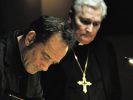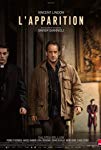Eye For Film >> Movies >> The Apparition (2018) Film Review
The Apparition
Reviewed by: Andrew Robertson

The Congregation of the Doctrine of the Faith investigate miracles. One may have occurred. They ask an impartial, lapsed, man of something parallel to faith, Jacques Mayano (Vincent Lindon) to chair a committee. They will investigate a sighting of the Virgin Mary.
Told across several chapters - Rome, The Messenger, Anna, The Icon of Kazan, Revelation - The Apparation is at once weighty and ethereal, a drama not only about religion but about reaction to religion, faith, process, and something perhaps akin to healing. It is a film that has as many meetings and is doing as much with them as Shin Gojira - congregations say something not only in who is assembled, but how - and as it unfolds with a measured pace the uncertainty within grows ever more palpable.

It's not easy stuff - there is no small degree of suffering, from the events that bring Mayano home from his role as a war correspondent to the last scenes in a refugee camp. There is no small degree of crisis, of faith, of conscience. There is no small degree of juxtaposition - elements like the bomb-checking mirror on a stick of a uniformed Swiss guard, loads slung beneath helicopters, the coffee machine in the Vatican vaults beneath pedestrian terraces, convent machinery for the stuffing of pillows, again and everywhere the balance not just of modernity but of interim modernity. Millenia of faith and millenials of faith, even, perhaps, Millenarian intent upon Apocalypse, or underlying revelation. Metaphor abounds. A small French village is saturated with pilgrims, systems cannot cope. Systems have mechanisms for coping. There are procedures, advocates, interviews to be recorded.
Shot with something that approaches a documentary remove, there are moments whose composition still grab - the framing of passengers in a car with a single camera from the front is as striking in its own way as that tumbling gyre in Children Of Men, but its impact comes not from a technical audacity but from a balance of elements in fore- and back-ground. A bracket of nuns, the sheltering church, authority and uniform, angelic decay in the middle, iconic perhaps in every sense. The depiction of uncertainty is difficult, but Xavier Giannoli's film gives and with-holds enough, implies and suggests enough, bestows and sacrifices enough that it rewards viewers with something that makes the ineffable concrete.
Working with previous co-writer Marcia Romano and Jacques Fieschi, Giannoli has created something complex, but it is in its minimalisms, its room, its implication that it flourishes. This is not bombast, no lilies are gilded, the smallest of details start to draw other import. A hoodie that Galatea Bellugi's Anna always wears has no cord, and as the film draws on this starts to seem less like a deliberate invocation of inattention than a conscious step away from ornament, then a further act of protective precaution, then an allusion to more traditional robes, oil-painted texture recalling rougher weaves cast again in blended poly-cotton, then just a hoodie, tan, upon a pale teenager. Kookai ex nihilo.
There are secrets here, impositions of power, recourse to authority, questions, smugglings, confrontations, seizure of artifacts, patrician concern and ever, ever, muddied modernities. Skype and YouTube, blood-typing and warrants, merchandise, mystery, mythography.
I mention a documentary feel, but that's perhaps a function of scale, of focus, of the creation of parallel through the edit, of a minimalism of depiction married with conscious framings. That which is seen is seen, that which is discussed is discussed. Things recalled matter - a scream, a story - things elided, obfuscated, matter too. There's also something novelistic - they are called Chapters, though that recalls literature and liturgical organisation both - and there have been parallels drawn with Dan Brown's work, even in programme notes when it showed at 2018's Edinburgh Film Festival. That's a disservice to it - this is not conspiratorial bombast, senseless sensation. This is something measured, minor - the blood of Christ is at once miraculous and quotidian, mass-produced, Mass-produced - and this is not about that. It is of a singular vision. That focus (Eric Gautier's work again impeccable) is important - modern day production design matters most, at times, because it is so easily checked, from Wikipedia pages to magazine offices - and that grounding in reality makes it possible to suspend disbelief. All the more important because that is what this is about.
The greatest strength of The Apparation is how ably and confidently it projects not just uncertainty, but the nebulous possibility of it - that it is as capable of creating and sustaining and subverting that uncertainty is testament (pun intended) to the skill of those involved, Lindon and Bellugi especially, and will reward the faith of audiences. There are pilgrimages within - France, Italy, the Middle-East all feature, importantly for tone and feel, and this too is worth the trip.
Reviewed on: 04 Aug 2018

















